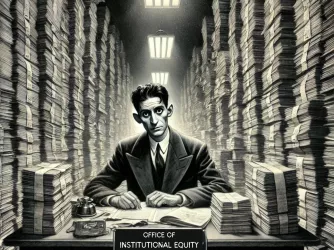Table of Contents
Victory: Portland State University Rescinds Charges Against Student over Phone Call with Employee
I'm pleased to announce that Portland State University (PSU) student Rachel Cain's record has been wiped clean after she was initially found guilty of charges of "disruption" and "failure to comply" due to the content of a telephone conversation between Cain and an employee of PSU's library system. Her case—like others we've seen at FIRE—is a useful reminder of why universities cannot hold students to the same speech standards to which they may hold their employees, a worrying trend on college campuses today.
Here are the facts of Cain's case. On March 16, 2011, Cain had a telephone conversation with a PSU library employee regarding a certain loan policy. The conversation grew contentious, as Cain felt that the employee was being rude and deliberately unhelpful to her. According to Cain, the library employee hung up on her. Frustrated with what she saw as the employee's lack of professionalism, Cain later called the library and left a voicemail message complaining about the employee.
Two days later, Cain received an email from PSU Library Access Services Manager Molly Blalock-Koral, informing her that due to her "hostile treatment toward library staff," Cain was required to submit "any requests you have of the library ... to me as a formal written request." Blalock-Koral also informed Cain that she had reported her to PSU's student life office. Indeed, on March 23, Cain received an email from PSU's Office of the Dean of Student Life, alleging violations of PSU's Code of Student Conduct and Responsibility including "Obstruction or Disruption of University Activity or Process" and "Failure to comply with a University Official's requests." Of the March 16 telephone conversation, the email stated that Cain had "disrupt[ed] University processes by engaging in consistently disruptive behavior toward University staff members," without providing further evidence. (In fact, virtually no evidence was provided to her at any point in the initial process or appeals process, despite her requests.)
In our April 22 letter to PSU President Wim Wiewel, we detailed the lack of due process granted Cain:
Powell and Cain met for her hearing on March 30. According to Cain, she was permitted to see a one-paragraph complaint against her and was permitted to share her account of events, but she was not permitted to keep a copy of the complaint. According to Cain, the complaint was written not by the staff member with whom Cain had spoken, but by Blalock-Koral. Powell would not permit Cain to record the hearing.
On April 11 at 6:11 p.m., Powell emailed Cain a formal notice that he had found her "responsible" for both charges. Powell did not, as the March 23 letter had promised, assign her case to a hearing body.
Instead, Powell stated that "[Cain's] actions have been incongruent with the University Code of Conduct to the point of borderline threatening and inappropriate behavior." Yet, Powell did not provide details or evidence regarding any failure to comply with an order, nor did he describe any disruption to the Library, much less a material or substantial disruption. Powell assessed a $10 fine against Cain and put her "on a probationary period" of unspecified length, during which "all communication with the Library" from Cain must occur via email with Blalock-Koral.
It got worse: As part of its proposed sanctions, PSU required Cain to sign a "Behavioral Agreement" attesting to the "borderline threatening and inappropriate" nature of her speech, under the threat of "additional disciplinary action" if she failed to do so. Despite this threat against her student standing, Cain refused to sign the agreement and appealed PSU's decision. Accordingly, a hold was placed on her student account, preventing her from registering for classes. FIRE's April 22 letter to PSU was entered as part of her appeal.
Cain's case remained unresolved throughout much of the summer, but happily, on August 1, 2011, Cain received an email from Jackie Balzer, Vice President for Enrollment Management and Student Affiars at PSU, stating that "Based on the information received I have determined that the charges and sanctions should be dismissed." Further, PSU made clear that it would reverse the $10 fee charged to Cain; PSU's financial office even clarified that it would amend the line item next to the former charge (now reading $0.00) to remove any mention that the former fee had been discipline-related. FIRE commends Portland State University for stepping up and recognizing Cain's free speech rights here.
As I mentioned at the outset, Cain's case is another reminder of how colleges get themselves into trouble when they try to hold students to the same codes of professionalism they may hold their employees to, even though disciplining students for being rude to employees may seem sensible to some. Certainly, life is frequently easier when we all treat each other with courtesy and respect. But given human nature, making this mandatory at all times is unrealistic. Remember, Cain's complaint was that the library employee was being rude to her in the first place.
Students are not employees, and public university students certainly do not lose their First Amendment rights when their speech is rude to staff of the university. Universities may no more enforce modes of professional conduct on their undergrads than they may enforce "civility" policies that have the effect of putting campus discourse under the control of the most sensitive or intolerant people on campus. We may not always like it, but the First Amendment clearly protects speech others may find rude or offensive. As we reminded PSU, and countless universities before it:
[T]he First Amendment's guarantee of freedom of expression does not exist to protect only non-controversial speech; indeed, it exists precisely to protect speech that some members of a community may find controversial or offensive. The right to free speech includes the right to say things that are deeply offensive to many people, and the Supreme Court has explicitly held, in rulings spanning decades, that speech cannot be restricted simply because it offends people. In Papish v. Board of Curators of the University of Missouri, 410 U.S. 667, 670 (1973), the Court held that "the mere dissemination of ideas—no matter how offensive to good taste—on a state university campus may not be shut off in the name alone of ‘conventions of decency.'" First Amendment protection extends even to those statements that anger others. In Terminiello v. Chicago, 337 U.S. 1, 4 (1949), the Court held that "a function of free speech under our system of government is to invite dispute. It may indeed best serve its high purpose when it induces a condition of unrest, creates dissatisfaction with conditions as they are, or even stirs people to anger." In Texas v. Johnson, 491 U.S. 397, 414 (1989), the Court eloquently explained the rationale behind these decisions, stating that "[i]f there is a bedrock principle underlying the First Amendment, it is that the government may not prohibit the expression of an idea simply because society finds the idea itself offensive or disagreeable."
Universities may not punish such speech that is clearly protected under the First Amendment, and they certainly cannot claim that it is either disruptive or threatening—rationales both cited by PSU in punishing Cain. In Virginia v. Black, 538 U.S. 343, 359 (2003), the Supreme Court held that only "those statements where the speaker means to communicate a serious expression of an intent to commit an act of unlawful violence to a particular individual or group of individuals" lose their First Amendment protection as true threats. Cain's telephone conversation—one in which she was hung up on—can hardly be said to meet either strict standard.
Several schools have fallen into the trap of feeling it is their position to punish students merely because of how their speech was interpreted. Famously, for example, the University of Georgia tried to punish student Jacob Lovell for sending a single jocular email to UGA's parking services department, complaining about the lack of accommodations for scooters on the campus. Lovell was charged with "disruption" and "disorderly conduct." See also FIRE's case at Clemson University, where student Wil Kirwan was charged with, among other things, "Harassment," "Disorderly Conduct," and "Failure to Comply with Official Request" on the basis of a single email to a Clemson official. Lovell and Kirwan received charges similar to Rachel Cain's at PSU; they were also resolved within days of FIRE bringing their cases to their schools' attention. Clemson acknowledged that "[T]he First Amendment protects speech even when it is rude or offensive."
A campus where a student can be punished merely if someone doesn't like the tone in his or her voice is no campus where a real marketplace of ideas—or, for that matter, regular adult conversation—can thrive. Thankfully the First Amendment, as PSU has now remembered, protects students from just such a result.
Recent Articles
FIRE’s award-winning Newsdesk covers the free speech news you need to stay informed.

UPDATE: Another federal appeals court backs academic free speech for public employees

Feds to Columbia: ‘You want $400 million in contracts back? Do this (or else)’

A picture is worth a thousand words — unless a college district bans it
